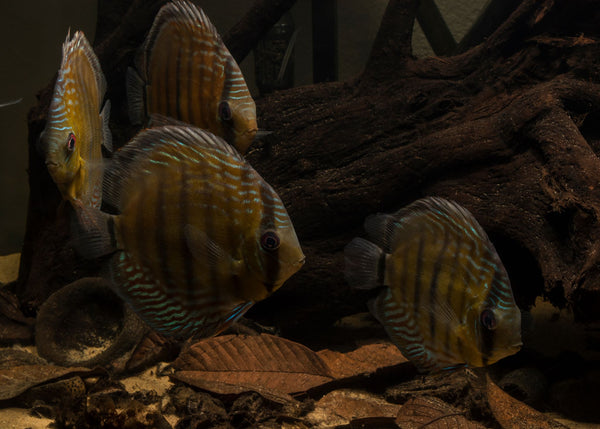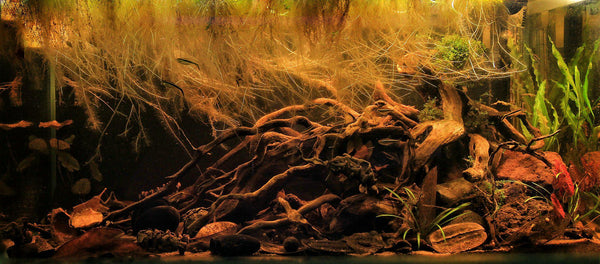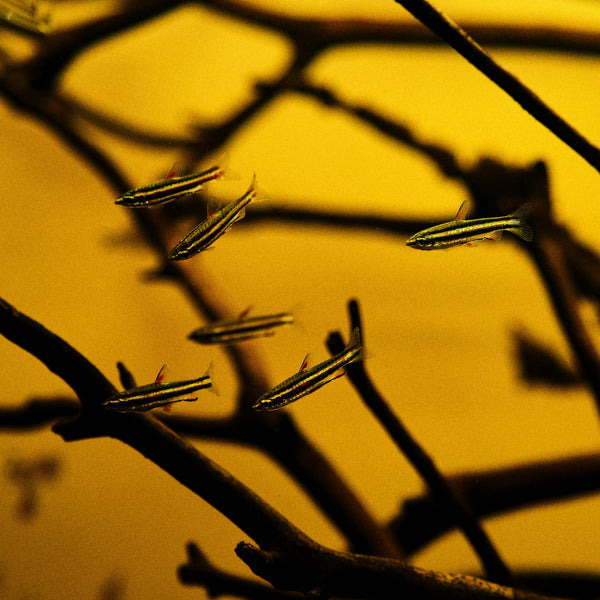- Continue Shopping
- Your Cart is Empty
The ins-and-outs of water quality and its role in the botanical-style aquarium.
One of the great "contradictions" about the botanical-style aquarium is that we run a tank full of all sorts of decomposing leaves and seed pods and stuff, yet value high water quality- and indeed- achieve it-on an ongoing basis. We have this enormous quantity of stuff breaking down, yet somehow manage to maintain high standards of cleanliness and good water quality in our tanks, don't we?

"Cleanliness" is something that gives me a lot to think about, in the context of botanical-style aquariums. I mean, when it comes to managing a botanical-style aquarium, you are already at a sort of "disadvantage" when it comes to running a "spotlessly clean" aquarium. You've essentially committed to a tank which contains large quantities of natural materials, busily recruiting biofilms and fungal growths, all the while, in the process of breaking down.
At any given time, the bioload in your aquarium is likely as great- or greater- than a fully stocked community aquarium with lots of well fed fishes. I mean, decomposing leaves, right?
Yeah.

So, it certainly makes sense to ask ourselves what the implication is of all this "stuff" breaking down in our tanks? Are we simply adding tons of organic materials in there for our beneficial bacteria to handle, just sort of "treading water" to keep things from falling into biological chaos, or are we actually helping foster and feed a small "food chain" of organisms which collectively assimilate this material and the associated organic compounds it produces?
Or, is it somewhere in between?

There must be a thousand ways to set up an aquarium and operate it. In fact, its probably several times that amount. And no one can ever seem to agree what the "best" way to go is. And that's okay. There are a lot of cool approaches you can try. So, while we might disagree on the best approach or style, we all seem to have a common goal:
Providing the best possible environment for our fishes.
Pretty much every really serious aquarium hobbyist can agree on one thing: It's important to have information about what's going on in his or her aquariums. Observation, collection of data, and interpretation of the information gathered have been keys to our success in so many areas of endeavor in the hobby.
And, I admit, our botanical-style aquariums are a bit of an enigma.
I mean, we have tanks with all of this stuff decomposing in the water, yet manage to maintain high water quality and stability for extended periods of time without any real "magic", in terms of procedure or equipment.
What gives?

And of course, not being a scientist makes it kind of challenging for me to make all kinds of assertions about water quality and chemistry, so I will at least try to focus on what we want to achieve, and what we can measure, water quality-wise, and how botanical-style aquariums seem to be able to "pull it off" given their vast quantities of leaves, seed pods, etc.
Now, we kind of have a pretty good "handle" on which tests make the most sense for our pursuits. It's a given that ammonia, nitrite, pH and DKH are the key indicators which most hobbyist will want to know about.

And then, there are the tests which give us information on the quality of the environment we've created- nitrate and phosphate. Nitrate (NO3) is not necessarily considered "toxic" at a specific level, although a typical rule of thumb is to keep readings under 50 mg/l- or better still, 20mg/l or less, for most fishes at various stages of their life cycle.

Although there is no "lethal dose", as indicated above, and many fishes can tolerate prolonged exposure to up to 500 mg/l of nitrate, studies have revealed that prolonged exposure to elevated levels of nitrate may reduce fishes' immunity, affecting their internal functions and resistance to disease.
Many fishes can adapt- to a certain extent- to a gradual increase in nitrate over time, although long-term physiological damage can occur. And of course, some fishes are much more sensitive to nitrate than others, displaying deteriorating overall health or other symptoms at much lower levels..

One of the interesting things about nitrate is that it can and will accumulate and rise over time in the aquarium if insufficient export mechanisms (ie; water exchanges, lack of chemical or biological filtration capacity exist within the aquarium. This, of course, gives the impression that fishes are "doing okay" when the reality is that they are exposed to a long-term stressor. The presence of plants, aquatic or terrestrial, known for their utilization of nitrate as a growth factor, is also considered a viable way to reduce/export nitrates, along with overall good husbandry (ie; stable fish population, proper feeding technique, etc.)

In our botanical-filled, natural-style aquariums, I have personally never observed/measured high level of nitrate-with or without plants. In fact, with a good husbandry regime in place, undetectable (on a hobbyist-grade test kit, at least) levels of nitrate have been the norm for my systems. I think that the highest nitrate reading I've personally recorded in a botanical-style system which I maintained was around 10 mg/l.
Why is this?
Well, I personally feel that well-maintained systems, including our heavily botanically-influenced ones, offer a significant "medium" for the growth and proliferation of beneficial bacteria species, such as Nitrospira. I have a totally ungrounded "theory" that the presence of botanicals, although in itself a contributor to the the biological load on the aquarium, also is a form of "fuel" to power the denitrification process- a carbon source, if you will, to elevate levels of biological activity in an otherwise well-maintained system.

Okay, sounds like a lot of cobbled-together "mumbo jumbo", but I think there is something to this.
I mean, when you think about it, a botanically-rich aquarium, with leaves and other materials, fosters bacteria, fungi, biofilms, and supports crustaceans and other organisms which can consume the botanicals as they breakdown, along with fish wastes and other organics.
.

Something to think about!
I find this among the most exciting potential benefits of a botanical-style aquarium. In fact, I believe that, once serious scientific study is conducted on this stuff, it may prove to be a foundational component of the botanical-style aquarium. We will embrace the addition and decomposition of natural materials in our aquariums as a sort of "catalyst" to create a stable, productive closed ecosystem, which effectively metabolizes the materials within...
Just like in Nature.
A sort of "on board" biological filtration system, if you will, with the added benefit that fishes will consume some of these organisms. Perhaps, even the basis for a sort of "food web", something that we know exists in all natural aquatic ecosystems.

The other measure of water quality that most of us should consider is phosphate (PO4). It's a salt of phosphoric acid- an inorganic chemical. It's an essential chemical for the growth of plants, and other living organisms. Phosphate gets a lot of "bad press" in the hobby as a contributor to the growth and proliferation of algae, which it is. However, it's really only half of the equation, as algae only grows if nitrogen is also present...So, it's a contributor to algae issues and overall water quality- not the main culprit.

In the reef hobby, phosphate has been vilified as a growth inhibitor to coral, and all manner of additives, reactors, and removal media have been developed to combat it. The reality, IMHO, is that phosphate- although a great measure of overall water quality, tends not to become a problem in an otherwise well-managed aquarium. It gets into our systems in the first place via food, and will accumulate if mechanisms for its absorption/utilization or removal don't exist.

So, yeah- perform those regular water exchanges.
Oh, and both nitrate an phosphate are present in tap water...so when I espouse the use of an expensive RO/DI unit to pre-treat your tap water, I'm recommending a means to eliminate it at the source, giving you at least a good start. For a variety of reasons we've touched on numerous times here in "The Tint", reverse osmosis/deionization units, albeit somewhat pricy, are, in my opinion, an essential piece of equipment for any serious hobbyist.
So, this is all well and good...this discussion of how botanicals themselves help foster a biologically-rich closed ecosystem, capable of assimilating many of the dissolved organics which have long been vilified in aquariums. Yeah. Yet, how do we keep water quality high in our tanks on a practical level?
You apply the same level of attention to the blackwater/brackish botanical-style aquarium as you would to any other.

And of course...this is the elegant segue into the part about your "weekly maintenance regimen" yet again, right?
Well, yeah. It's a foundational practice. One which I really shouldn't have to be talking about here...But you asked, so...How much to change?
Do "whatever floats your boat", as they say.
If you're a bi-weekly-type of tank maintenance person, do that. If you're a once-a-month kind of person...Well, you might want to re-examine that! LOL. Botanical-style blackwater tanks, although remarkably stable once up and running, really aren't true "set-and-forget" systems, IMHO.
You'll want to at least take a weekly or bi-weekly assessment on their performance and overall condition. Now, far be it from me to tell YOU- the experienced aquarist-how to run your tanks. However, I'm just sort of giving you a broad-based recommendation based upon my experiences and those of many others over the years with these types of systems.
You need to decide what works best for you- and your animals, of course...

Now, remember, you're dealing with a tank filled with decomposing botanical materials. Good overall husbandry is necessary to keep your tank stable and healthy- and that includes the dreaded (by many, that is) regular water exchanges. As we pointed out, at the very least, you'll likely be cleaning and/or replacing pre filter media as part of your routine, and that's typically a weekly-to bi-weekly thing.
Just sort of "goes with the territory" here.

During water exchanges, I typically will siphon out any debris which have lodged where I don't want 'em (like on the leaves of that nice Amazon Sword Plant right up front, or whatever), but for the most part, I'm merely siphoning water from down low in the water column. I'm a sort of "leave 'em alone as they decompose" kind-of-guy.
It's really not something that is unique to this style of aquarium. The main difference between these types of tanks and almost all others is that we tend to go over the top at embracing and encouraging a lot of natural processes to occur in our tanks, as opposed to trying to remove every single trace of organics.
In general, the water quality of our botanical-influenced, natural systems is something worthy of a lot of research, experiments, and discussion in our community. There is so much interesting stuff happening in our tanks- and so many things we don't know...Specifically, how very low pH aquariums are best kept biologically stable.
That's another topic for another time, for sure!
And of course, the function- both biologically and environmentally- of deep leaf litter beds I the aquarium. We have just scratched the surface of managing truly realistic, functional leaf litter beds at scale in our systems. There's so much more to learn!

We have taken our first tentative footsteps beyond what has long been accepted and understood in the hobby, and are starting to ask new question, make new observations, and yeah- even a few discoveries- which will evolve the aquarium hobby in the future.
So, in the mean time- apply common sense...the stuff you've learned since you were a beginner about maintenance and husbandry, and mix in a little faith in Nature and the work she does; be a bit more accepting of her processes, and everything should work out about right.
Stay curious. Stay studious. Stay experimental. Stay bold. Stay diligent...
And Stay Wet.
Scot Fellman
Tannin Aquatics








Scott Fellman
Author